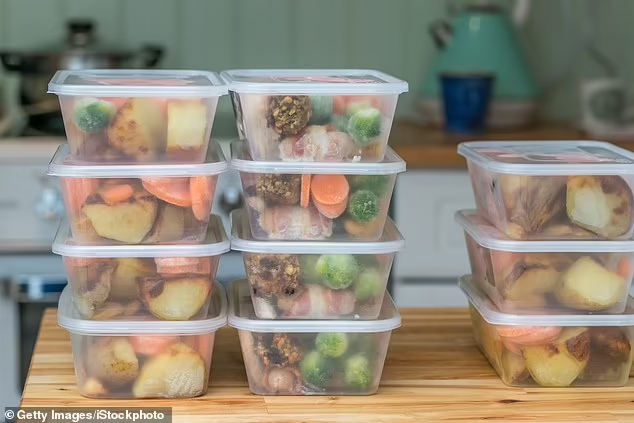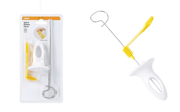Meal Prepping Blunders: How You Might Be Making Yourself Sick and How to Combat Them
By
- Replies 1
Meal prepping—the act of preparing meals in advance—is a popular way to save time and money. But does it also increase the risks of food contamination?
According to Quadram Institute Microbiologist Dr Matthew Gilmour, there are several mistakes that some home cooks practise while preparing food, making these meals not safe for consumption.
Dr Gilmour pointed out that one of the most common mistakes is the act of leaving cooked food out for long periods.
“After food is cooked and cooled down, package it up and get it in the freezer as quickly as possible — within two hours,” the microbiologist said.
If you leave the food out for more than two hours, the bacteria in the dish can multiply to harmful levels, according to the expert.
Dr Gilmour also recommended covering the food with foil while it cools, and transferring it to a new dish to prevent cross-contamination and ensure the food cools down more quickly.
Sylvia Anderson, a food hygiene consultant, agreed with these tips, recommending that you should avoid leaving cooked food in a hot dish, as this can allow bacteria to grow.
As for pre-cooked meals, Ms Anderson said that they should only be kept in the fridge for three days, after which it becomes unsafe.
She explained: “In the hospitality industry, pre-cooked food is kept in the fridge for only three days. After that it becomes unsafe — so it’s best to freeze the other two portions.”
And yet, she sees people on social media regularly batch-cooking and storing food in the fridge for up to five days.
“I’m amazed when I see people on Instagram [the social media platform] placing five-day batch-cooked portions in the fridge,” she said.

Meal prepping is becoming a popular trend among people who are looking to reduce their grocery bills. Credit: Getty Images/iStockphoto.
This trend could be contributing to the rising number of food poisoning cases in England and Wales. Last year, there were 4,369 recorded cases of food poisoning, but the actual number is thought to be much higher.
Ms Anderson advised people to be more careful with their batch-cooking and to freeze any leftovers that they won't be eating within three days. Otherwise, they could be putting their health at risk.
If you're like most people, your freezer is probably full of pre-prepared meals that you've been meaning to eat for weeks, if not months.
But according to the food hygiene consultant, you should only be storing them in there for a month at most. After that, the quality of the food starts to decline, and you run the risk of food poisoning.
To keep track of how long your food has been in the freezer, Ms Anderson suggested labelling it with a date. And don't assume that just because it's frozen, it's safe from bacteria…
Dr Gilmour claimed that microbes are merely dormant in the freezer and will reanimate once the food is thawed. So, one must be very careful when defrosting food and make sure it's heated all the way through before eating.
If you thought microwaving your frozen raw meat was the quickest way to defrost it, think again!
According to experts, this method can actually encourage bacteria growth.

Dr Gilmour revealed some of the most common mistakes that most home cooks practise when preparing meals in advance. Credit: The Daily Mail.
So, what's the best way to thaw raw meat?
Dr Gilmour says the best way is to thaw it slowly in the fridge. And whatever you do, don't run it under warm water as this could contaminate your sink and nearby utensils with microbes.
With foodborne illnesses on the rise, it's important to be extra careful when it comes to what you're eating.
While most cases are mild and will only result in vomiting, diarrhoea, and fatigue, some more serious cases can lead to meningitis, Guillain-Barré syndrome, and even death.
Some of the most vulnerable groups when it comes to foodborne illnesses are the oldest and youngest members of society and those undergoing treatment for other conditions. This is because their immune systems are not as strong and therefore, they are more susceptible to infection.
Listeria is one of the most dangerous foodborne illnesses out there and can often be found in soft cheese or contaminated meat. If it's not treated quickly, it can travel to the brain and cause meningitis, which is an infection of the protective tissues around the brain and spinal cord. Listeria can also cross the placenta of a pregnant woman and infect the foetus.
Another dangerous foodborne illness is campylobacter, which is often found in undercooked chicken. In rare cases, it can lead to Guillain-Barré syndrome, which is a disorder in which the immune system attacks the nerves, causing severe movement issues in the limbs.
If you think you might have a foodborne illness, the best thing to do is rest and drink plenty of fluids. However, avoid sweetened drinks as bacteria can feed off the high sugar content.
The best way to prevent getting a foodborne illness is to be careful about what you're eating and make sure you're cooking everything properly.
One food that you should be especially careful about reheating is rice, as it is home to bacillus cereus, a toxin-producing bacteria. Takeaway rice is often already reheated once in the restaurant, so it's best to avoid it altogether.
So, there you have it, folks! We often recommend meal prepping as one of the most efficient ways to save money, especially now that all of us are feeling the pinch from the rising costs of living.
However, we would like to reiterate that while the practice is efficient for reducing your grocery bills, meal prepping should always be done right. When it comes to foodborne illness, remember that prevention is always better than a cure.
According to Quadram Institute Microbiologist Dr Matthew Gilmour, there are several mistakes that some home cooks practise while preparing food, making these meals not safe for consumption.
Dr Gilmour pointed out that one of the most common mistakes is the act of leaving cooked food out for long periods.
“After food is cooked and cooled down, package it up and get it in the freezer as quickly as possible — within two hours,” the microbiologist said.
If you leave the food out for more than two hours, the bacteria in the dish can multiply to harmful levels, according to the expert.
Dr Gilmour also recommended covering the food with foil while it cools, and transferring it to a new dish to prevent cross-contamination and ensure the food cools down more quickly.
Sylvia Anderson, a food hygiene consultant, agreed with these tips, recommending that you should avoid leaving cooked food in a hot dish, as this can allow bacteria to grow.
As for pre-cooked meals, Ms Anderson said that they should only be kept in the fridge for three days, after which it becomes unsafe.
She explained: “In the hospitality industry, pre-cooked food is kept in the fridge for only three days. After that it becomes unsafe — so it’s best to freeze the other two portions.”
And yet, she sees people on social media regularly batch-cooking and storing food in the fridge for up to five days.
“I’m amazed when I see people on Instagram [the social media platform] placing five-day batch-cooked portions in the fridge,” she said.
Meal prepping is becoming a popular trend among people who are looking to reduce their grocery bills. Credit: Getty Images/iStockphoto.
This trend could be contributing to the rising number of food poisoning cases in England and Wales. Last year, there were 4,369 recorded cases of food poisoning, but the actual number is thought to be much higher.
Ms Anderson advised people to be more careful with their batch-cooking and to freeze any leftovers that they won't be eating within three days. Otherwise, they could be putting their health at risk.
If you're like most people, your freezer is probably full of pre-prepared meals that you've been meaning to eat for weeks, if not months.
But according to the food hygiene consultant, you should only be storing them in there for a month at most. After that, the quality of the food starts to decline, and you run the risk of food poisoning.
To keep track of how long your food has been in the freezer, Ms Anderson suggested labelling it with a date. And don't assume that just because it's frozen, it's safe from bacteria…
Dr Gilmour claimed that microbes are merely dormant in the freezer and will reanimate once the food is thawed. So, one must be very careful when defrosting food and make sure it's heated all the way through before eating.
If you thought microwaving your frozen raw meat was the quickest way to defrost it, think again!
According to experts, this method can actually encourage bacteria growth.
Dr Gilmour revealed some of the most common mistakes that most home cooks practise when preparing meals in advance. Credit: The Daily Mail.
So, what's the best way to thaw raw meat?
Dr Gilmour says the best way is to thaw it slowly in the fridge. And whatever you do, don't run it under warm water as this could contaminate your sink and nearby utensils with microbes.
With foodborne illnesses on the rise, it's important to be extra careful when it comes to what you're eating.
While most cases are mild and will only result in vomiting, diarrhoea, and fatigue, some more serious cases can lead to meningitis, Guillain-Barré syndrome, and even death.
Some of the most vulnerable groups when it comes to foodborne illnesses are the oldest and youngest members of society and those undergoing treatment for other conditions. This is because their immune systems are not as strong and therefore, they are more susceptible to infection.
Listeria is one of the most dangerous foodborne illnesses out there and can often be found in soft cheese or contaminated meat. If it's not treated quickly, it can travel to the brain and cause meningitis, which is an infection of the protective tissues around the brain and spinal cord. Listeria can also cross the placenta of a pregnant woman and infect the foetus.
Another dangerous foodborne illness is campylobacter, which is often found in undercooked chicken. In rare cases, it can lead to Guillain-Barré syndrome, which is a disorder in which the immune system attacks the nerves, causing severe movement issues in the limbs.
If you think you might have a foodborne illness, the best thing to do is rest and drink plenty of fluids. However, avoid sweetened drinks as bacteria can feed off the high sugar content.
The best way to prevent getting a foodborne illness is to be careful about what you're eating and make sure you're cooking everything properly.
One food that you should be especially careful about reheating is rice, as it is home to bacillus cereus, a toxin-producing bacteria. Takeaway rice is often already reheated once in the restaurant, so it's best to avoid it altogether.
So, there you have it, folks! We often recommend meal prepping as one of the most efficient ways to save money, especially now that all of us are feeling the pinch from the rising costs of living.
However, we would like to reiterate that while the practice is efficient for reducing your grocery bills, meal prepping should always be done right. When it comes to foodborne illness, remember that prevention is always better than a cure.







